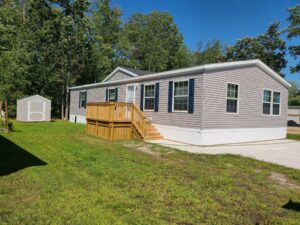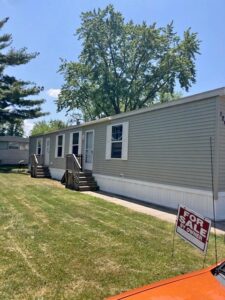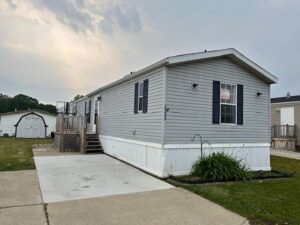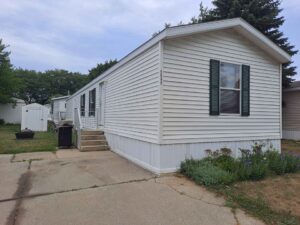Looking for a new home? Why not consider buying a mobile home? With their rising popularity as an affordable housing option, mobile homes are capturing the attention of savvy buyers. But before you dive in, it’s crucial to ask yourself the right questions. What benefits does purchasing a mobile home offer? What factors should you keep in mind as a buyer? Let’s explore these key considerations together in this article Checklist for Buying a Mobile Home.
27 – Point Checklist for Buying a Mobile Home
In today’s real estate market, where prices continue to soar, mobile homes provide an enticing alternative. They offer affordability without sacrificing comfort or style. Moreover, their flexibility allows homeowners to easily relocate if needed. However, like any significant investment, there are important factors to consider when buying a mobile home.

Looking to buy a mobile home? Before you dive in, there are crucial factors to consider. Don’t be swayed by aesthetics alone; ensure the home’s structural integrity is top-notch. From location and park regulations to hidden costs and inspection checks, it’s vital to do your homework. While affordability may draw you in, don’t overlook the long-term investment and potential resale value. Prioritize safety features, energy efficiency, and overall quality to make a smart purchase decision. Keep these key points in mind to avoid buyer’s remorse and secure a mobile home that meets both your needs and budget.
Key Takeaways
Understand the different types of mobile homes available to make an informed decision based on your needs and preferences.
Consider the pros and cons of buying a mobile home in a park versus on land to determine the best option for your lifestyle and financial situation.
Use a comprehensive checklist when inspecting potential mobile homes to ensure all essential aspects are covered before making a purchase.
Assess the age and materials used in the construction of the mobile home to gauge its durability, quality, and potential maintenance requirements.
Evaluate the systems (plumbing, electrical, HVAC) and overall stability of the mobile home to avoid unexpected repairs or safety hazards in the future.
Be aware of the various associated fees such as lot rent, utilities, and maintenance costs to accurately budget for all expenses related to owning a mobile home.
Understanding Home Types
Mobile Homes
Mobile homes are factory-built homes constructed before the implementation of federal HUD standards in 1976. They are transportable and typically placed in mobile home parks. Mobile homes are usually single-story structures with a chassis for mobility. This is one of the reasons its important to have a checklist for buying a mobile home.
Manufactured Homes
Manufactured homes, on the other hand, are built after 1976, adhering to strict HUD regulations. They come in various sizes and configurations, offering a more permanent housing solution compared to mobile homes. These homes are energy-efficient and customizable.
Modular Homes
Modular homes consist of prefabricated sections or modules that are assembled on-site. They offer flexibility in design and can resemble traditional stick-built houses. Modular homes are known for their durability and cost-effectiveness.
Park Homes
Park homes, also known as park model RVs, are smaller than traditional mobile or manufactured homes. They are designed for seasonal or temporary living and are ideal for vacation properties. Park homes often feature modern amenities and stylish interiors.

Buying in a Park vs Land
Financial Benefits
When buying a mobile home in a park, you often have a lower purchase price compared to buying land. This is due to the fact that you are only purchasing the home itself, not the land it sits on. park homes typically come with affordable monthly rent for the land they occupy.
The manufactured home park setting also offers greater buying power to potential mobile homeowners. With a fixed location and multiple units, parks can negotiate bulk deals with manufacturers, passing on the savings to buyers. Moreover, when purchasing in a park, you may qualify for mobile home loans specifically designed for this type of housing.
Homeowner’s Association Fees and Lease Ownership
One key aspect to consider when buying in a park is the presence of a homeowner’s association (HOA). While these fees can add to your monthly expenses, they often cover maintenance of common areas and amenities like swimming pools or clubhouses. Another factor is lease ownership; when you buy in a park, you are essentially leasing the land from the park management. This arrangement can affect your long-term financial commitments and control over your property.
Lifestyle Benefits
Owning a mobile home in a park provides various lifestyle benefits. These communities often offer shared amenities such as recreational facilities, green spaces, and community events. Living in a park setting fosters a sense of community and social connection among residents. Many manufactured home parks are conveniently located near urban centers or natural attractions, providing residents with easy access to shopping, entertainment, and outdoor activities.

Checklist Essentials
Taxes
Researching taxes is crucial when buying a mobile home. Ensure you understand property tax rates and any specific taxes related to mobile homes.
Property Deed Research
Before making a purchase, conduct thorough research on the property deed. Verify ownership details, boundaries, and any restrictions that may affect your ownership rights.
Local Amenities
Consider the availability of local amenities when choosing a mobile home. Access to essential services such as grocery stores, hospitals, schools, and recreational facilities is vital for convenience.
Zoning/Building Codes
Investigate the zoning and building codes in the area where the mobile home is located. Ensure that the property complies with all regulations to avoid any legal issues in the future.
Proximity to Essential Services
Check the proximity to essential services like hospitals, fire stations, police stations, and schools. Living close to these services can be crucial in times of emergencies.
Boundary Markers
Verify the boundary markers of the property to avoid any disputes with neighbors in the future. Clearly marked boundaries provide clarity on your property limits.
Crime Rates
Research the crime rates in the neighborhood where the mobile home is situated. Ensuring a safe living environment is essential for you and your family’s well-being.
When considering purchasing a mobile home, it’s essential to have a comprehensive checklist in place. By covering aspects such as taxes, property deed research, local amenities, zoning/building codes, proximity to essential services, boundary markers, and crime rates, you can ensure a smooth buying process while minimizing potential risks.

Assessing Age and Materials
Lifespan and Durability
Mobile homes have an average useful life of about 30-55 years, depending on maintenance and materials used. Time is a crucial factor in assessing a mobile home’s condition.
Considering the design and materials of a mobile home is vital. Older models may have outdated features, while newer ones offer improved durability. Inspecting the home thoroughly before purchasing is essential.
Financial Considerations
Understanding the financial aspects of buying a mobile home is crucial. Lenders often consider the age of the home when determining financing options. The process involves evaluating your credit score and income to secure a loan.
Before buying, ensure you meet the down payment requirements set by lenders. Typically, down payments for mobile homes range from 5% to 20% of the total cost. Having a good credit score can help in securing favorable financing terms.
Customization Options
When purchasing a new mobile home, explore the various customization options available. From selecting floor plans to choosing interior finishes, buyers can personalize their homes to suit their preferences. Customizing your home allows you to create a space that reflects your style and needs.
Consider opting for energy-efficient upgrades during the customization process. Features like insulated windows, energy-efficient appliances, and HVAC systems can help reduce utility costs in the long run.
Evaluating Systems and Stability
Structural Integrity
When evaluating a mobile home, assess its structural integrity by checking for any signs of sagging floors, cracks in walls, or misaligned doors and windows. These issues can indicate underlying problems with the foundation or overall stability.
Inspect the roof for any leaks, missing shingles, or signs of water damage. A well-maintained roof is crucial to prevent water infiltration and maintain the structural integrity of the mobile home.
Mechanical Systems
Another important factor for a checklist for buying a mobile home is the mechanical systems. Examine the electrical system to ensure all outlets, switches, and fixtures are working properly. Faulty wiring can pose fire hazards and lead to electrical malfunctions if not addressed promptly.
Check the plumbing system for leaks, water pressure, and drainage issues. Proper plumbing is essential for daily activities like cooking, cleaning, and bathing in a mobile home.
Evaluate the HVAC system to see if it provides adequate heating and cooling throughout the mobile home. A functioning HVAC system ensures comfort and safety for occupants in various weather conditions.
Material Quality
Look for signs of wear and tear in materials used for construction, such as flooring, walls, ceilings, and cabinets. Warped floors, peeling paint, or damaged cabinets may indicate poor maintenance or subpar materials.
Inspect the insulation to ensure it is properly installed and in good condition. Adequate insulation helps regulate indoor temperatures and energy efficiency in a mobile home.
Summary:
Assess structural integrity through floor condition and wall alignment.
Inspect roof for leaks and water damage.
Check electrical system for functionality.
Examine plumbing system for leaks and water pressure.
Evaluate HVAC system for proper heating and cooling.
Look for signs of wear and tear in construction materials.

Specific Requirements for First-Time Buyers
If you’re a first-time buyer, it’s worth asking if there are any specific requirements or programs available tailored to your needs. Some lenders offer special financing options or down payment assistance programs aimed at helping first-time buyers enter the housing market. By exploring these possibilities, you might find more flexible credit score requirements or additional benefits that make homeownership more accessible.
Impact of Credit History on Interest Rates and Loan Terms
Your credit history not only determines whether you qualify for a loan but also affects the interest rates and loan terms offered by lenders. It’s essential to inquire about how your credit history impacts these factors when buying a mobile home. Generally, individuals with higher credit scores tend to receive better interest rates and more favorable loan terms compared to those with lower scores.

Credit Score When Buying a Mobile Home
To give you an idea of what to expect based on different credit scores, consider the following scenarios:
Excellent Credit (750+): With an excellent credit score, you’re likely to qualify for competitive interest rates and favorable loan terms.
Good Credit (700-749): While not as high as an excellent score, good credit still positions you well for securing reasonable interest rates and loan terms.
Fair Credit (650-699): With fair credit, you may encounter slightly higher interest rates and less favorable loan terms. However, it’s still possible to obtain financing.
Poor Credit (below 650): Individuals with poor credit may face challenges when obtaining a home loan. Lenders might require higher down payments or charge higher interest rates to mitigate the perceived risk.
Remember that these are general guidelines, and each lender has its own criteria. It’s crucial to discuss your specific situation with potential lenders to get a clearer picture of how your credit history will impact your mobile home purchase.
Tips for Purchasing a Mobile Home in a Park Setting
There are several important questions to ask before making a decision. By understanding the park’s rules and regulations, inquiring about costs associated with living in the park, and researching the reputation of the park management, you can make an informed purchase.
Understanding the park’s rules and regulations regarding home maintenance and appearance.
Before purchasing a mobile home in a park setting, it is crucial to familiarize yourself with the rules and regulations set by the park management. These guidelines dictate how you can maintain your home and what alterations you can make to its appearance. Some parks may have restrictions on exterior paint colors or require approval for any modifications made to your mobile home. By understanding these rules upfront, you can ensure that your vision for your living space aligns with the park’s guidelines.
Inquiring about monthly fees, utilities, and other costs associated with living in the park.
Another vital aspect to consider when purchasing a mobile home in a park is understanding the financial obligations involved. Inquire about monthly fees that cover amenities such as garbage collection, landscaping services, or access to communal facilities like swimming pools or gyms. Ask about utility costs such as electricity, water, and sewage services. Being aware of these expenses will help you budget effectively and determine if living in that particular park is financially feasible for you.
Do Your Research When Buying a Mobile Home
Researching the reputation of the park management and seeking feedback from current residents.
The reputation of the park management plays an integral role in ensuring a pleasant living experience. Take some time to research their track record by reading online reviews or reaching out to current residents for feedback. Consider factors such as responsiveness to maintenance requests, fairness in enforcing rules, and overall satisfaction among residents. A well-managed park with satisfied residents indicates a positive living environment and reliable park management.
Checklist For Buying a Mobile Home: Conclusion
By following these tips, you can make an informed decision when purchasing a mobile home in a park setting. Understanding the park’s rules and regulations regarding home maintenance and appearance will help you ensure that your living space meets your expectations. Inquiring about monthly fees, utilities, and other costs associated with living in the park is crucial for financial planning. Finally, researching the reputation of the park management and seeking feedback from current residents will give you insight into the overall experience of living in that particular park.
Remember, buying a mobile home is an investment, so it’s essential to gather all necessary information before making a purchase decision. Take the time to thoroughly understand the rules, costs, and reputation associated with living in a mobile home park to ensure a smooth transition into your new home.
Questions to Ask Your Mobile Home Manufacturer:
Warranty and Quality Assurance
What is the warranty on the manufactured homes you offer?
Can you provide a detailed breakdown of what the warranty covers?
Are there any specific limitations or exclusions in the warranty?
How long has your company been in business, and what is your track record for delivering quality homes?
Can you provide references from previous customers who have purchased homes from your company?
When making a significant investment like buying a mobile home, it’s crucial to ensure that you are protected by a comprehensive warranty. By asking about the warranty offered by the manufacturer, you can gain insight into their commitment to quality and customer satisfaction. A reputable manufacturer should be able to provide a clear explanation of their warranty terms and conditions, including any limitations or exclusions.
Furthermore, it’s important to inquire about the manufacturer’s experience in the industry. A well-established company with a proven track record is more likely to deliver high-quality homes that meet your expectations. Requesting references from past customers allows you to hear firsthand about their experiences with the manufacturer and helps build trust in their products.
Customization Options: Checklist for Buying a Mobile Home
What customization options are available for your manufactured homes?
Can I choose different floor plans, finishes, or appliances?
Are there any additional costs associated with customizing a home?
How much flexibility do I have in making changes during the construction process?
One advantage of buying a manufactured home is the ability to customize it according to your preferences. Inquire about the range of customization options offered by the manufacturer. This could include selecting different floor plans, finishes, or appliances that suit your needs and personal style.
Understanding any potential extra costs associated with customization is essential for budgeting purposes. Some manufacturers may charge additional fees for certain upgrades or modifications.
It’s also worth asking about flexibility during the construction process. Find out how open they are to accommodating changes or adjustments to the home’s design as it progresses. This information will help you determine if the manufacturer can meet your specific requirements.
Construction Standards and Materials: Checklist for Buying a Mobile Home
What construction standards do your manufactured homes adhere to?
Do you use high-quality materials in the construction process?
Can you provide information on the energy efficiency of your homes?
How are your homes tested for durability and safety?
Ensuring that a mobile home is built to proper construction standards is vital for its longevity and safety. Ask the manufacturer about the specific standards they adhere to, such as those set by relevant building codes or industry organizations.
Inquire about the materials used in their homes’ construction. High-quality materials contribute to a durable and well-insulated structure. It’s also worth asking about energy efficiency features, such as insulation levels or energy-saving appliances, which can lead to long-term cost savings.
To further evaluate the manufacturer’s commitment to quality, inquire about their testing procedures. Manufacturers should conduct rigorous tests to ensure their homes meet durability and safety requirements. Asking for details on these tests demonstrates your concern for a reliable and secure living environment.
Delivery and Installation Process
How does the delivery process work for manufactured homes?
Will you handle all aspects of installation, including site preparation?
Are there any additional costs associated with delivery or installation?
What is the estimated timeline from purchase to move-in?
Warranty Coverage and Terms: Checklist for Buying a Mobile Home
When buying a mobile home, it’s crucial to consider the warranty coverage and terms provided by the manufacturer. Understanding what is included in the warranty and how claims are processed can help you make an informed decision. Here are some important questions to ask:
How long is the warranty coverage? Inquiring about the length of warranty coverage is essential to know how long you’ll be protected against potential issues. Mobile home warranties typically range from one to ten years, so it’s important to understand the duration of coverage.
What components or issues are covered under warranty? It’s vital to ask what exactly is covered by the warranty and what isn’t. This will give you a clear understanding of which aspects of your mobile home are protected in case of damage or defects. Common items covered include structural problems, plumbing, electrical systems, heating and cooling units, appliances, and more.
How are warranty claims processed and resolved? Requesting information on how warranty claims are handled will help you understand the process involved in getting repairs or replacements when needed. Some manufacturers have their own service departments, while others may require you to contact authorized dealers for assistance.
The Details of A Mobile Home Warranty
Understanding the details of your mobile home’s warranty can provide several benefits:
Peace of mind: Knowing that your investment is protected by a comprehensive warranty offers peace of mind.
Cost savings: A good warranty can save you money on maintenance costs as many repairs will be covered.
Easy financing: Lenders often prefer financing mobile homes with warranties as they offer added security for both parties.
Efficient service: Having clear instructions on how to handle warranty claims ensures timely resolution of any issues that may arise.
It’s also worth noting that ownership laws regarding warranties may vary across different areas or states. Therefore, it’s essential to familiarize yourself with local regulations when purchasing a mobile home.
To ensure you have all the necessary information, consider reaching out to the dealer or manufacturer with these questions:
What is the cost of extending warranty coverage?
Are there any additional insurance options available to protect against damage or loss?
Can you provide a detailed breakdown of warranty plan coverage and exclusions?
Are there any specific maintenance requirements to keep the warranty valid?
By asking these questions, you can make an informed decision about your mobile home purchase and ensure that you are protected in case of any unforeseen circumstances. Remember, understanding the warranty coverage and terms is a crucial aspect of mobile home ownership.
Building Codes Compliance and Certifications
When buying a mobile home, it is crucial to ensure that the property complies with local building codes and safety standards. Asking the right questions about building codes compliance and certifications can help you make an informed decision and avoid potential issues down the line.
One of the first things you should inquire about is whether the mobile home meets all local building codes. These codes are put in place to ensure that homes are constructed safely and meet certain quality standards. By asking this question, you can determine if any modifications or repairs need to be made to bring the mobile home up to code.
It is important to ask if the mobile home has any certifications such as HUD labels or state-specific approvals. These certifications indicate that the home has met specific requirements set by government agencies or industry organizations. HUD labels, for example, demonstrate compliance with federal manufactured housing standards.
Requesting documentation proving compliance with fire safety regulations is also essential. Mobile homes should have proper fire safety measures in place to protect occupants from potential hazards. Inquire about smoke detectors, fire extinguishers, and escape routes within the home.
To ensure a thorough inspection of these aspects, it is advisable to hire a professional home inspector who specializes in mobile homes. They will have expertise in identifying any potential issues with building codes compliance and safety standards.
Another important document to request when buying a mobile home is the title certificate. This document verifies ownership of the property and ensures that there are no liens or legal encumbrances on it. It is essential for protecting your investment and ensuring a smooth transfer of ownership.
Final Thoughts: Making an Informed Decision when Buying a Mobile Home in 2022
In conclusion, purchasing a mobile home requires careful consideration and thorough research to ensure you make an informed decision. By following the checklist of key considerations and asking the right questions, you can navigate the buying process with confidence. Here are some important points to remember:
Age and Condition of the Mobile Home: Assessing the age and condition of the mobile home is crucial to determine its longevity and potential maintenance costs.
Type of Mobile Home and Park Regulations: Understanding the type of mobile home and park regulations will help you find a suitable community that aligns with your needs and preferences.
Plumbing and Electrical Systems Assessment: Checking the plumbing and electrical systems ensures they are in good working order, minimizing future repair expenses.
Construction Materials and Quality: Examining construction materials used in the mobile home will give you insights into its durability and overall quality.
Modifications and Additions History: Knowing if any modifications or additions have been made to the mobile home allows you to evaluate their impact on functionality and value.
Credit Score Requirements for Buying a New Mobile Home: Familiarize yourself with credit score requirements if you plan on purchasing a new mobile home, as it may affect financing options available to you.
Tips for Purchasing a Mobile Home in a Park Setting: Consider tips specific to buying a mobile home in a park setting, such as understanding park rules, amenities, fees, and community dynamics.
To further assist your decision-making process, here are some additional questions to ask your mobile home manufacturer:
Warranty Coverage and Terms
What does the warranty cover?
How long does the warranty last?
Are there any limitations or exclusions?
Building Codes Compliance and Certifications
Does the mobile home comply with local building codes?
Has it been certified by any relevant industry organizations?
By addressing these questions and factors, you can ensure that your purchase aligns with your needs, preferences, and budget. Remember to conduct thorough inspections, seek professional guidance if needed, and consult reviews or testimonials from other mobile home owners.
Checklist for Buying a Mobile Home: Conclusion
In conclusion, buying a mobile home requires careful consideration of various aspects. By following the checklist, asking the right questions, and conducting due diligence, you can make an informed decision that meets your housing needs. Take advantage of available resources and expert advice to navigate the process smoothly. Good luck with your mobile home purchase!
FAQs: Checklist for Buying a Mobile Home
Q: Can I finance the purchase of a mobile home?
A: Yes, financing options are available for purchasing a mobile home. However, credit score requirements may vary depending on lenders and whether you are buying a new or used mobile home.
Q: What should I look for when assessing the condition of a used mobile home?
A: When assessing the condition of a used mobile home, pay attention to signs of water damage or structural issues. Inspect plumbing and electrical systems, as well as the overall cleanliness and maintenance level.
Q: Are there restrictions on modifications or additions to a mobile home?
A: Park regulations or homeowner association rules may impose restrictions on modifications or additions to maintain uniformity within the community. It’s essential to review such guidelines before making any changes.
Q: How do I choose the right park for my mobile home?
A: Consider factors such as location, amenities offered by the park (e.g., swimming pool, clubhouse), monthly fees, community atmosphere, proximity to essential services like schools or healthcare facilities.
Q: What is the average lifespan of a mobile home?
A: The lifespan of a well-maintained mobile home can range from 30-55 years. Regular upkeep and proper maintenance significantly impact its longevity.
You might also be interested in our articles:
Mobile Home Shells: A Complete Guide

